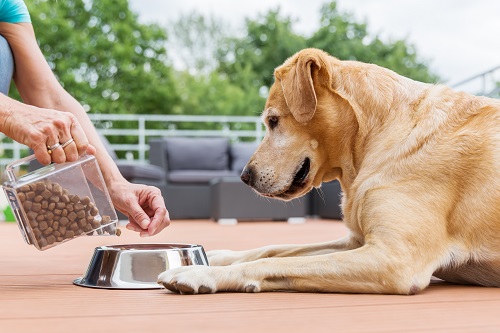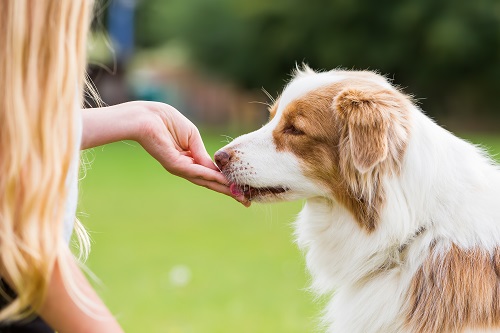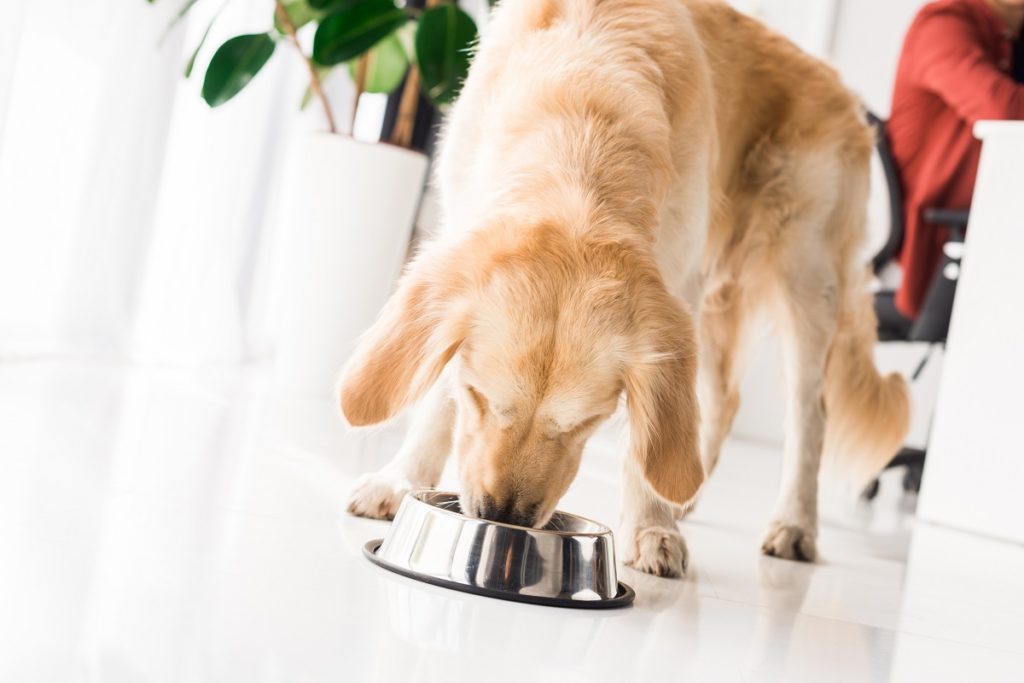When a serious problem with brand or product-wide food safety arises, supermarkets and grocery stores spring into action, putting up notices and pulling items from shelves. When it’s human food being recalled, it’s hard to miss the notifications, between social media mentions, news stories, and even talk of class action lawsuits.
When it comes to dog food, however, news can be a little sluggish to circulate. The shelf-stable nature of dog food in particular can lead to delayed responses, which in turn can put pets at risk. Pet owners need to be vigilant about what dog food has been recalled, and ready to switch brands or products as soon as possible if one should occur.
What Is A Dog Food Recall?
A recall occurs when a dog food manufacturer notifies the public and associated stores that the product is unsafe to consume. The recall may instruct them to bring the food in question to a pet food store or grocery store for a refund or exchange, or may indicate the food should be thrown away and a rebate form filled out online or through the mail.
Many pet food stores, particularly nationwide chains, have notification boards placed near their entrance where they will post these recall notices as they are circulated. If a dog owner is registered for newsletters or emails from the dog food brand in question, they may get notifications of recalls through this method, as well. Generally, however, the burden of research falls on the owner.
Why Do Dog Food Recalls Happen?
When dog food is recalled by the manufacturer or overarching brand, it’s typically because one of three common problems has occurred. The food or its ingredients may have become contaminated or spoiled in some way, there may be an issue with the ingredient or nutritional labeling, there could be a non-food physical object mixed into the food, or there may be a long-term packaging problem.
In general, both human and canine food tends to be safer when it’s sourced and manufactured in the United States, as it is subjected to regulations and inspections not found in foreign factories. When a problem occurs with food that is manufactured and shipped from out of the country, the red flags tend to take longer to discover, and longer to report. Here are four common reasons linked to dog food recalls:
1.) Contaminants: Dog food – both bagged dry “kibble” and canned “wet” varieties – is created with proteins derived from meat. While the meat used is regulated and inspected, just as with meat bought from a grocery counter, issues can still arise. While meat is a common culprit for diseases and bacteria, fruit and vegetable ingredients can carry them as well, which means no brand of dog food, no matter what their claims may be, is ever completely safe from the potential of a contaminant-based recall. Careful processing and packaging practices can certainly reduce risk, but dog owners should also be vigilant for recall information so they can act quickly. Examples of contaminants found in dog food can include:
- Salmonella
- E. Coli
- Certain Molds
- Listeria
These harmful substances may have come into contact with the dog food products through contaminated ingredients, improper cleaning and maintenance of processing equipment, or issues with bulk storage containers and/or the consumer-facing containers themselves. An example of this might be moisture entering a kibble-dispensing bulk tank when it shouldn’t, or improper warm temperatures allowing bacteria to thrive before the dog food is packaged.
of processing equipment, or issues with bulk storage containers and/or the consumer-facing containers themselves. An example of this might be moisture entering a kibble-dispensing bulk tank when it shouldn’t, or improper warm temperatures allowing bacteria to thrive before the dog food is packaged.
2.) Improperly expressed or formulated nutrition: Every so often, a human food recall makes the news for an “unstated ingredient.” While the inclusion of a relatively small ingredient might not seem like a big deal, it can be a harmful or even deadly mistake for consumers allergic to that small ingredient. Owners of dogs with similar sensitivities, special diets, or allergies need to be able to rely on labeled nutrition information. Common labeling and nutrition information in dog food recalls include:
- Excessive Vitamin D (this can cause kidney failure and even death)
- Grain Content
- Beef Content
- Dairy Content
- Poultry Content
Each one of these ingredients represents a potential allergen or toxin that could make a large dog sick or prove deadly to a smaller breed. While these issues thankfully don’t happen often, it’s still a good idea to proceed slowly when introducing a dog to a new type of food, just to be safe. Veterinarians typically recommend, provided the “old” food isn’t harmful to the dog in question, gradually mixing the new type of dog food into the old type in greater quantities over time until mealtime consists of completely new food. This gradual technique will allow a pet parent to spot any potential issues right away, when adverse symptoms are most likely to be mild and completely reversible.
3.) Presence of foreign objects: In a processing environment, particularly when blades are involved for proteins, accidents happen. Most commonly, parts of the machinery or containers shear loose, sending (for example) a rubber gasket or metal from the inside of wet dog food cans into blades or grinders. Occasionally a substance foreign to the manufacturing process will meet the same fate, such as a piece of clothing worn by a factory worker. If this isn’t caught before the food leaves the factory for store shelves, a recall must occur to keep the problem contained.
When this happens, particles and micro-particles end up mixed into the food or even compressed into the kibble, posing a threat to dogs that eat them. Plastic pieces can become lodged in the intestines during digestion, and small metal particles can cut the inside of the mouth, esophagus, or stomach. Recalls for foreign object presence are generally triggered proactively, rather than after reports of injury, as is more common with ingredient contamination or addition.
4.) Packaging: While far less common than the other three reasons behind dog food recalls, packaging mishaps can and do happen. Even when prepared, stored, and shipped exactly to specifications, faulty manufacturing components from third-party providers can foul up the works – literally. Defective metal “pop tabs” on cans of wet dog food can break the airtight seal, allowing moisture, bacteria, and mold into a can that otherwise looks normal. These contaminants can then sicken or injure the dog that eats the food inside, even if the food was completely safe when it was canned.
Most dog food manufacturers outsource at least part of their manufacturing to other service providers. While they may make the actual food in house, they may also count on a company to, for example, can or bag their finished food products. These service providers are part of what is called a supply chain, and they can become the proverbial weakest link in that chain with shoddy practices or oversight. Ethical dog food companies will take responsibility for problems created by these companies by issuing recalls.
Dog Treats May Be Recalled Too
A dog’s daily diet isn’t the only cause for concern – edible treats and even non-edible toys can experience recalls as well. Edible treats like bones and dog snacks are just as vulnerable to contaminants as kibble and wet food, and toys may contain loose pieces or parts that dogs could swallow or choke on.
 These recalls can be even more elusive to find than dog food recalls, so it’s important for pet parents to stay informed by checking notices online and at their pet store chain of choice when they introduce new toys and treats. Treats made of animal parts – e.g. pig ears, rawhide bones, and dried beef bones – are especially susceptible to contaminants, as they aren’t processed and cooked in the same conditions used for dog food.
These recalls can be even more elusive to find than dog food recalls, so it’s important for pet parents to stay informed by checking notices online and at their pet store chain of choice when they introduce new toys and treats. Treats made of animal parts – e.g. pig ears, rawhide bones, and dried beef bones – are especially susceptible to contaminants, as they aren’t processed and cooked in the same conditions used for dog food.
How Can I Keep My Dog Food Safe?
Recalls are a scary reality for devoted dog owners, as even the most popular brands of dog food have been recalled or investigated at some point. Household-name brands like Kibbles N’ Bits, Gravy Train, Ol’ Roy, and even prestige brands like Rachel Ray’s Nutrish and Blue Buffalo have all been recalled in recent years. Generally these recalls happen for a portion of the line or a specific flavor or type of food, rather than the entire line.
Pet parents that want to make sure the food they’re feeding their dog is safe can take a few extra steps to ensure peace of mind at dinnertime:
- Commit to regular vet checkups: While this might seem an odd precaution when food is the concern, regular vet visits for a dog will give you a baseline of his health. If a food is adversely affecting him over time, these tests will help prove how adding or removing that food injured him. Not only is this a crucial part of his overall health and treatment, it can also assist owners in proving their claim in the event of an injury or lawsuit.
- Always visually inspect dog food: This includes giving the dry food bag or wet food can a once-over in the store during purchase, and examining food before it’s served.
- Does the can seem bloated or “bowed out” in any way?
- Do the seam and/or pop tab look untampered with and tightly sealed?
- Does the sealed can or bag have any unusual or foul odors?
- Does the wet food or dry kibble look to be discolored or darkened?
- Is the canned food or bagged dry food in date and fresh?
- Is there any dampness or residue on the bag, can, or label?
If the answer to any of these questions is ‘yes’, do not purchase or serve the dog food. While it might be a simple perception issue or something harmless, no dog food has a higher price than the safety and well-being of a beloved pet.
Buying weekly from the market, if feasible, can add an extra layer of protection to the process too. Grocery stores and pet food stores are often the first to be notified of recalls due to their stock on hand, and so food on the shelves will be as safe as possible at the time of purchase.
What If My Dog Ate Recalled Food?
If there’s one thing that can cause nearly instant anxiety for a pet parent, it’s realizing that a dog just ate – or worse, has been eating – recalled food. This scenario can happen to even the most conscientious dog owners, as dog food in dry kibble form is readily available in bags as large as 50 pounds. For some dogs, this works out to weeks or even months of food. This means a recall might not come to light until a new big bag needs to be purchased.
In this situation, the best thing a dog parent can do is educate themselves on the recall to determine what triggered it. After that information is in hand, a call to the vet is in order – if the dog in question hasn’t been acting sick or ill, chances are he will be just fine – but it never hurts to make sure.
After the vet visit has been secured, all recalled food should be removed from the house and placed in the garbage to ensure no more is accidentally consumed. Before doing so, take pictures or cut out the portion of the bag or label that has the stock or lot number and expiration date on it. This will offer proof that the recalled food was purchased, and ensure eligibility for replacement food and/or any legal action that may be taken.
Summary: Staying Proactive With Dog Food Recalls & Canine Nutrition
When in doubt, the American Medical Veterinary Association keeps a live, searchable list of all current dog food and dog treat recalls, as well as other pet foods. A periodic search of this list, as well as a watchful eye both in the store and at dinnertime back home, will help keep mealtime safe for canine companions of all sizes and breeds. While the issues that can contaminate dog food will always be a cause for concern, avoiding them is easy with some forethought, research, and smart purchasing habits at the pet food store. Remaining proactive in a beloved dog’s nutrition not only protects his safety and overall well-being, but can ensure him a happy and healthy life for years to come.
If you are up for unique and tasty treats for your dog, you can also try our all-natural CBD dog treats!
Sources Cited:
- Gibson, Kate. “16 dog food brands may cause heart disease in pets, FDA warns.” CBS News.com, July 1, 2019, https://www.cbsnews.com/news/dog-food-and-heart-disease-fda-warns-16-dog-food-brands-may-cause-heart-disease-in-pets/. Accessed August 26, 2019.
- Klein, Dr. Jerry, CVO. “What to Do if Your Dog’s Food Is Recalled.” AKC.org (American Kennel Club), January 2, 2019, https://www.akc.org/expert-advice/health/dog-food-recall/. Accessed August 26, 2019.
- “Dog Food Recalls.” Dog Food Advisor.com, (various dates by report), https://www.dogfoodadvisor.com/dog-food-recalls/. Accessed August 26, 2019.
- “The Best Food Options for Your Dog with Allergies.” PetMD.com, (no publish date), https://www.animalbiome.com/blog/your-dog-needs-vitamin-d-too-much-can-be-toxic. Accessed August 26, 2019.
- “Animal Food Recalls and Alerts.” AVMA.org (American Veterinary Medical Association), (various publish dates), https://www.avma.org/News/Issues/recalls-alerts/Pages/pet-food-safety-recalls-alerts-fullyear.aspx. Accessed August 26, 2019.




